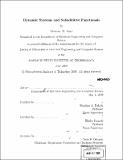Dynamic systems and subadditive functionals
Author(s)
Itani, Sleiman M
DownloadFull printable version (6.993Mb)
Other Contributors
Massachusetts Institute of Technology. Dept. of Electrical Engineering and Computer Science.
Advisor
Munther A. Dahleh and Emilio Frazzoli.
Terms of use
Metadata
Show full item recordAbstract
Consider a problem where a number of dynamic systems are required to travel between points in minimum time. The study of this problem is traditionally divided into two parts: A combinatorial part that assigns points to every dynamic system and assigns the order of the traversal of the points, and a path planning part that produces the appropriate control for the dynamic systems to allow them to travel between the points. The first part of the problem is usually studied without consideration for the dynamic constraints of the systems, and this is usually compensated for in the second part. Ignoring the dynamics of the system in the combinatorial part of the problem can significantly compromise performance. In this work, we introduce a framework that allows us to tackle both of these parts at the same time. To that order, we introduce a class of functionals we call the Quasi-Euclidean functionals, and use them to study such problems for dynamic systems. We determine the asymptotic behavior of the costs of these problems, when the points are randomly distributed and their number tends to infinity. We show the applicability of our framework by producing results for the Traveling Salesperson Problem (TSP) and Minimum Bipartite Matching Problem (MBMP) for dynamic systems.
Description
Thesis (Ph. D.)--Massachusetts Institute of Technology, Dept. of Electrical Engineering and Computer Science, 2009. Cataloged from PDF version of thesis. Includes bibliographical references (p. 125-131).
Date issued
2009Department
Massachusetts Institute of Technology. Department of Electrical Engineering and Computer SciencePublisher
Massachusetts Institute of Technology
Keywords
Electrical Engineering and Computer Science.